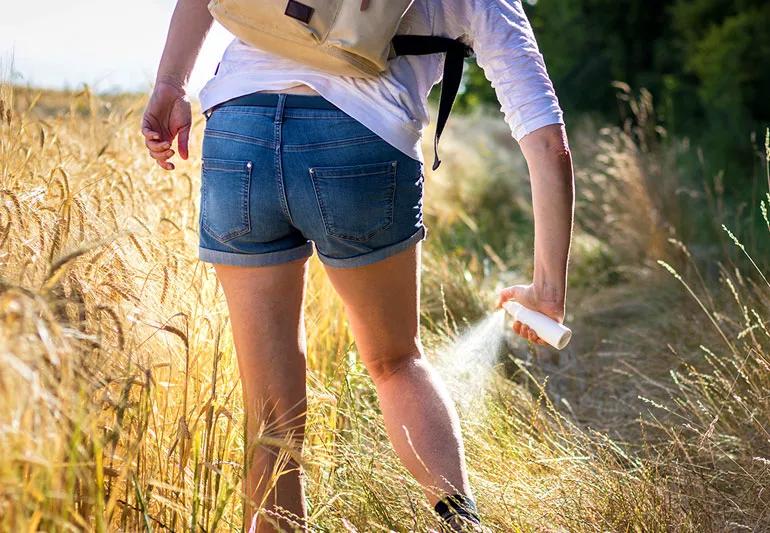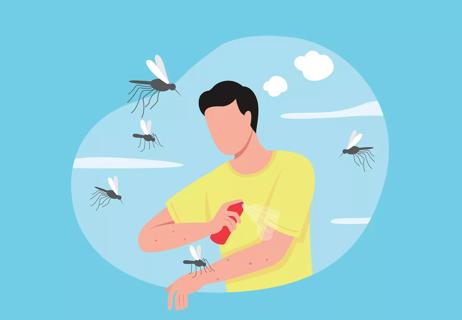Studies show the insect repellent is safe and effective at preventing insect-borne illness

Nobody wants to become a buffet for bloodthirsty mosquitoes or ticks. But is dousing yourself or your kids with a DEET-based bug spray really the best answer? Applying chemicals to skin just seems … well, unhealthy.
Advertisement
Cleveland Clinic is a non-profit academic medical center. Advertising on our site helps support our mission. We do not endorse non-Cleveland Clinic products or services. Policy
Let’s check in with dermatologist Amy Kassouf, MD, to find out whether DEET is safe for you and your family.
Let’s start with the basics: DEET is a chemical mixture used as an insect repellent. The name is an acronym built from its scientific ID — N,N-diethyl-meta-toluamide, or diethyltoluamide. (Clearly, DEET is a bit catchier and easier to say.)
U.S. Army researchers developed DEET in 1946 given the battles that soldiers fought against mosquitoes in World War II. The repellent entered the civilian realm in 1957.
Today, DEET is used by more than 200 million people around the world to ward off mosquitoes, fleas, ticks, flies and chiggers. Avoiding bites means avoiding insect-borne illnesses such as:
“We’re seeing an increase of these mosquito- and tick-borne diseases,” says Dr. Kassouf. “The more I see these illnesses, the more I become a proponent of DEET. It’s the most effective ingredient we have to keep bugs at bay.”
Studies show that DEET is quite safe when used as directed. In a 2014 review of the repellent, the U.S. Environmental Protection Agency (EPA) found no “risks of concern” to people or the overall environment.
Advertisement
In the U.S., DEET is registered for use on your skin, hair, clothes and footwear. (Side note: There’s also a DEET product approved for horses.)
Now that doesn’t mean there haven’t been any reactions to DEET. It’s a chemical, after all — and bodies often react to chemicals. Some people experience rashes or irritated skin after using DEET. It can also irritate your eyes if sprayed too close to your peepers.
More alarming, there have been rare reports of seizures associated with DEET. But according to the National Pesticide Information Center, most of those cases followed people drinking products with DEET or otherwise using them in ways that don’t follow recommended guidelines.
But overall, reactions are few and far between given the hundreds of millions of users.
As noted, researchers say that health concerns connected to DEET have been rare — and that includes when the repellent is used on kiddos. Given that, the EPA has no age restriction for using products with DEET.
The American Academy of Pediatrics (AAP) recommends applying DEET sparingly as needed until children reach age 2. The AAP also urges parents to be “especially cautious” about using DEET on newborns or premature infants.
Guidelines for using insect repellent advise that children shouldn’t handle DEET products or apply them on their own. In addition, it’s recommended that treated skin be washed with soap and water after going back inside.
When applying insect repellent on children, spray your hands and rub it onto their faces so they don’t inhale the vapors. Keep the products off little hands, too, given how kiddie fingers always seem to end up in their mouths.)
Studies haven’t shown a connection between DEET use and pregnancy-related issues or increased risk of birth defects. Researchers say that the benefits of using DEET during pregnancy to avoid insect-borne illness “may outweigh any possible risk.”
This is especially true if you’re in an area where the Zika virus is active, says Dr. Kassouf. Studies show that the Zika virus can cause birth defects.
Still concerned and want to minimize your exposure? Then try covering up with more clothing to limit how much DEET-based insect repellent reaches your skin. (Plus, it gives pesky bugs less area to target.)
It’s important to follow directions when using DEET-based bug spray. Some safety tips to keep in mind:
Advertisement
Still uncertain about DEET? Natural bug sprays, like citronella and lemon eucalyptus oil, might be helpful for light mosquito duty.
But if you’re in an area with prevalent tick-borne or mosquito-borne illnesses, you might want to look beyond the all-natural options. DEET remains the “gold standard” for insect repellent, says Dr. Kassouf.
“Used correctly,” she says, “it prevents more health problems than it causes by far.”
Advertisement

Sign up for our Health Essentials emails for expert guidance on nutrition, fitness, sleep, skin care and more.
Learn more about our editorial process.
Advertisement

Keep ‘mozzies’ at bay by avoiding scented body products, beer and certain colored clothes

Vanilla extract won’t keep mosquitoes away for long, if at all — and could even attract other bugs, like wasps or flies

Alpha-gal syndrome has become more common and is a leading cause of anaphylaxis

These red, raised bites often show up in a zigzag pattern on areas of your skin that come into contact with bedding

Twice daily tick checks, the right bug sprays and long pants can help you prevent tick-borne diseases

Bug bites create tiny openings in your skin that can let in dangerous bacteria

Using insect repellent, covering up and keeping your property dry can help keep the buggers at bay

Kissing bugs are insects that can carry a dangerous parasite that causes Chagas disease

Even small moments of time outdoors can help reduce stress, boost mood and restore a sense of calm

A correct prescription helps your eyes see clearly — but as natural changes occur, you may need stronger or different eyeglasses

Both are medical emergencies, but they are very distinct events with different causes